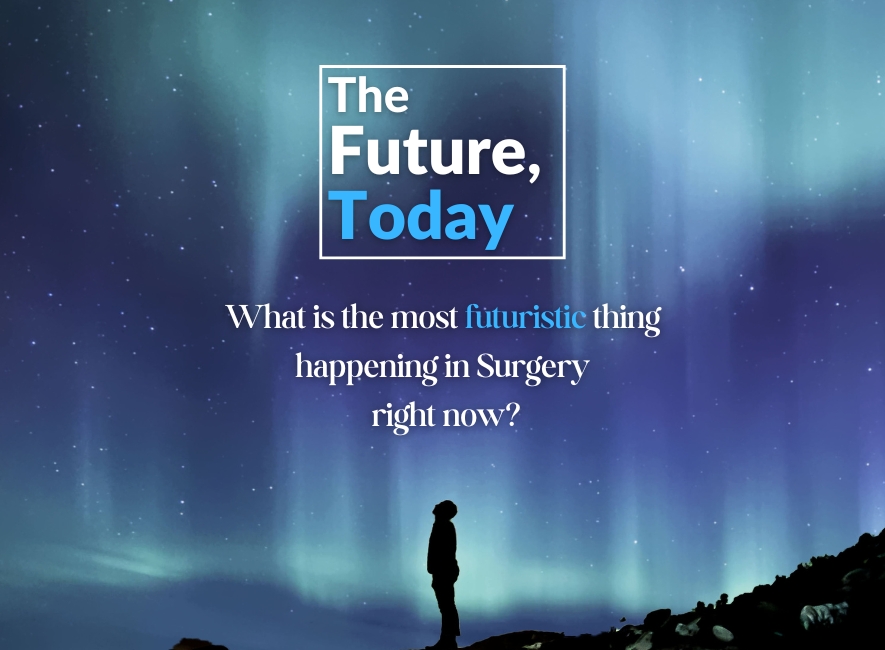We’ll be adding more to this story throughout the year, so check back or follow us via our Healthpoints newsletter.
As we enter the second quarter of the 21st century, we posed a simple question to our doctors:
"What is the single most futuristic thing we're doing in surgery today?"
Here are some answers.
Dr. Craig Smith, Chair of Surgery:
"Well, it depends on how you define “doing” because I would say tissue engineering and its applications, but most of them are not quite in the doing stage. They're being tried here and there. And not only depending on how you define doing, but depending on how you define tissue engineering. It's out there in heart valves, for example, in congenital and transplant. The stuff going on in labs is very exciting and shows the promise of substituting engineered tissues that are much more successful long term with the stuff we currently do. But it's still so futuristic, it's not quite there yet.
The robotics applications are somewhat futuristic. In the last couple of years, it's really started to take off in ways that it hadn't for 20 years. And it's not so much that we're doing different things with it, but they're finally able to do many standard things and many more advanced things that were out of the reach for robotics before, and it's likely to open up an acceleration in technology. We got away from the era when only one company was supportable by the amount of robotics being done, which had a constraining effect on innovation. As it gets more successful and into more hands and more cases, then the competitive pressures that bring other companies and other innovators in will probably start to bear fruit.
I wish I could say that AI was that thing, but it would be a little bit like tissue engineering. It's sort of teetering there on the brink of application, but not quite in application."
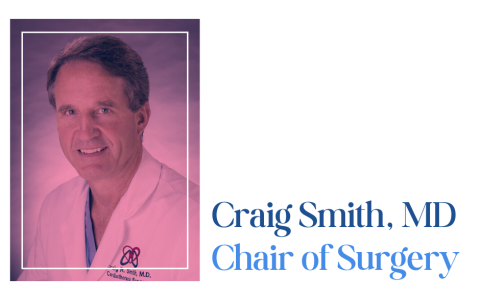
Read our in-depth interview with Dr. Smith about the current and future state of the field of surgery
Dr. Roshni Rao, Chief of Breast Surgery:
"I think the biggest thing is working not as a single surgeon but as a whole, working across a diagnosis. It used to be that some problems were only surgical, and there are still some of those, but most of the medical diseases or diagnoses are now multifaceted. So, the approach needs to be multidisciplinary or transdisciplinary if you will. No surgeon I know works in a vacuum, whether you're cardiac, vascular, or breast surgery.
There are not many disease processes where you do not have to consider the whole patient. It’s problem-solving, and we're going to bring all these experts to sort out the best approach. Perhaps it's medical, perhaps it's surgical, and perhaps in the future, it's some other management altogether that we're not even aware of, like genetic management. Instead of just being a surgery department, we’ll likely have a vascular disease process management team and a breast problem diagnosis management team. It will change how we think. You won’t just exist in your little world but also be aware of what else is happening in medicine, genetics, radiation, and everything else."
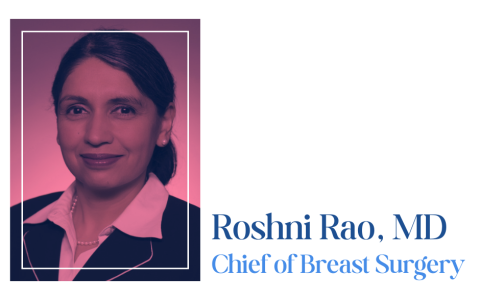
Read our in-depth interview with Dr. Rao about the current and future state of breast surgery
Dr. James Lee, Chief of Endocrine Surgery:
"Well, one of the biggest things is what everyone is already talking about, artificial intelligence. Maybe we'll get to the point where you'll have a doc bot that you can chat with and it will accurately diagnose you. Who knows? But I think the other uses of advanced neural networks are incredibly profound.
More specifically, one of the most exciting things that we're doing is trying to figure out new paradigms for how we educate people. It's wonderful if you can be in the presence of a world expert like Jen Kuo, Eric Kou, or Katie McManus and learn how to do certain things, but access to those experts isn’t easy. So, we have to be better at educating the next generations of practitioners. One of the really cool projects that Katie McManus is doing is using virtual reality to help medical students get more out of their education.
For example, one project uses virtual reality to train them on how to successfully interact in an operating room environment before they actually get there. How awesome is that? There are some really exciting things going on in the education world. As things like augmented reality and virtual reality start to make their way into it, I think it's only going to get more and more interesting."

Read our in-depth interview with Dr. Lee about the current and future state of endocrine surgery
Dr. Abraham Krikhely, Chief of Bariatric Surgery:
"The most futuristic thing in surgery today is how technology is going to completely revolutionize what surgery looks like in the long term—everything is changing, especially with the advent of artificial intelligence. That's going to change the way we interact with patients, the way we interact with data, the way we ask questions, both of our patients, of ourselves, and of the data. AI has the potential to give insights during surgery, like how much force is being applied to the tissue, or to highlight anatomy that you may have been blind to, or even help you identify or recognize cancer that was invisible to the human eye.
Robotic surgery is another area where innovation is driving the future. Most surgeries I do nowadays are all robotic, taking advantage of the most cutting-edge latest developments, technology-wise, in the field. When you add AI into the equation and, let’s call it compute—using computers to do the math on the data to then bring insights into the case—I think it’s going to be amazing.
I envision AI being incorporated into surgery, whether through robotics or through other technological means that perhaps improve the way surgery is performed. The possibilities are vast, and as these technologies advance. It's completely going to revolutionize everything."
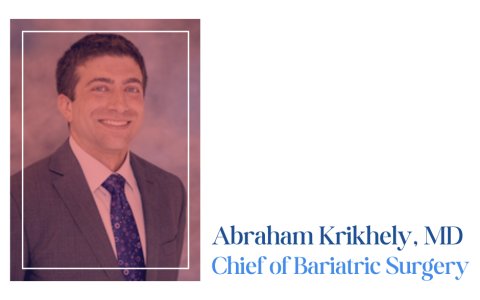
Read our in-depth interview with Dr. Krikhely about the current and future state of bariatric surgery
Dr. Thomas O'Donnell, Vascular Surgeon:
“I think the most influential trend across all of surgery is how much we can now do with less and less invasiveness—whether that’s through robotics or endovascular techniques. The ability to treat complex conditions with minimal impact on the patient is transformative. Patients obviously prefer it, and we do too.
There are futuristic things like AI on the horizon, but they haven’t had a huge impact yet. We’re still figuring out how to use them in meaningful ways. But the shift toward less invasive approaches—that’s happening now, and it’s only accelerating.
From a vascular standpoint, one of the most exciting things has been the development of new branched and fenestrated grafts for complex aortic aneurysms. There was a 10- to 12-year stretch without any new device approvals—then in just the last year or two, we’ve seen two new multi-branch grafts approved, and we’re in a clinical trial for another. It’s a major shift. After a long lull, we’re suddenly gaining momentum, and that’s going to expand what’s possible for our patients.”
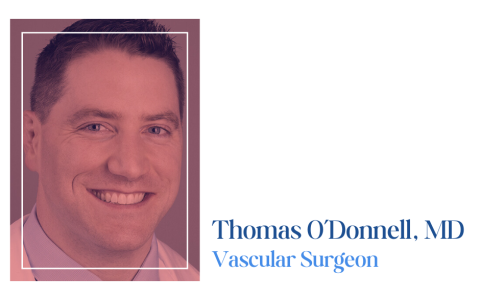
Read our in-depth interview with Dr. O'Donnell about the current and future state of vascular surgery.
Dr. Thomas Imahiyerobo, Chief of Pediatric Plastic Surgery:
"I think the two most futuristic things we’re doing in surgery at large are the integration of robotics and predictive modeling.
As far as robotics is concerned, I think it’s a really cool concept—that we could use technology like robotics to perform surgery better, potentially quicker, and in a way that’s more minimally accessed than we’re doing now. Robotics has been integrated into many fields of surgery. Plastic surgery is just starting to think about how we can incorporate it into what we do. A lot of plastic surgery has traditionally been big, open, transformative surgery. Robotics tends to have more of a role when you're trying to minimize incisions and access.
But we’re starting to do a lot more minimally invasive surgery in plastic surgery. One example is the endoscopic approaches we use for correction of craniosynostosis—what used to be a really big, massive open surgery we now do through small access incisions. That’s an area where something like robotics might play a role one day, which I think would be really cool. It could increase the reliability of the procedure, shorten it, and potentially make it even safer.
Predictive modeling is also a really exciting area we’re integrating more and more as craniofacial surgeons. Predictive modeling uses computer programming to forecast how parts of the body can move—like facial bones or soft tissue. It’s getting better and better. We can now run through an entire surgery on a computer beforehand and then bring that model into the OR to guide us on the day of surgery.
I think in the future, combining robotics and predictive modeling may allow us to do things we can’t even imagine doing today. That’s what makes it so exciting."
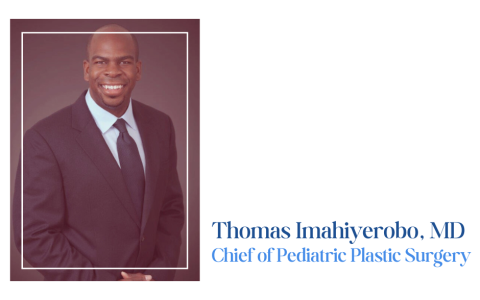
Read our in-depth interview with Dr. Imahiyerobo about the current and future state of craniofacial surgery
Dr. Naikhoba Munabi, Plastic Surgeon:
"I think the most futuristic thing is individualizing and making very patient-specific decisions on their treatment course and outcomes. I think a lot of surgery for a long time has been algorithmic—meaning if a patient presents with a certain problem, you look up in the table of contents, find that problem, and then it lists out what your options are.
With innovation, particularly in plastic surgery, where there's a lot of creativity in how you can solve problems, you can now consider a lot of the patient's priorities and goals and come up with a treatment protocol that is best suited to them. One that minimizes the amount of surgery they need to undergo, streamlines their recovery, and gives them the best outcome.
Plastic surgery has always been at the forefront of that because it’s a specialty that designs a lot of what we do based on principles as opposed to specific surgical procedures. But I do think that’s where surgery is going. And that’s undoubtedly one of the advantages of things like virtual surgery planning (VSP)—that it can be very tailor-made to a specific patient."
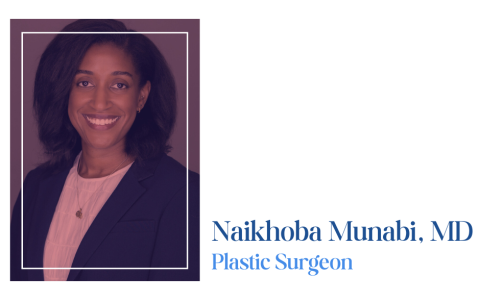
Read our in-depth interview with Dr. Munabi about the current and future state of plastic and reconstructive surgery
Dr. Joshua Sonett, Chief of Thoracic Surgery:
“The most futuristic thing we’re doing in surgery is really meshing with what we’re doing in medicine—tailoring treatment, and procedures in particular, to the patient and the genetic makeup of whatever malady they have. It’s about matching those two together to get the smallest amount of trauma with the most benefit.
One shoe is not going to fit anybody anymore. It’s very particular to each patient, and that includes minimally invasive surgery, which will become even less invasive—or no surgery at all—for some patients. For others, more maximal surgery might actually be the right fit. Every patient is their own story.
It’s going to be matched to their genetics, their physical condition, and maybe even their social condition—whatever gives them the best chance at a productive life, in the way they want to live it. Least disruptive and most beneficial. Robotics is where we are right now, but it’s just a tool. It’ll keep evolving into the next tool. The point is less and less invasive, with less trauma. I suspect that the robotic surgery we’re doing today will seem grossly traumatic compared to what it’s going to be in ten years.”
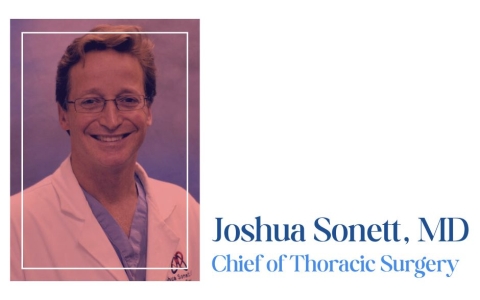
Read more about Dr. Sonett and the current and future state of thoracic surgery
Dr. William Middlesworth, Chief of Pediatric Surgery:
“I think maybe the most futuristic thing, at least in my particular area of interest, is the potential for tissue engineering. One of the most formidable clinical challenges we face is in treating esophageal atresia, especially when a baby’s esophagus is interrupted and there’s too large a gap for us to join the ends.
There are all sorts of creative ways that distance is bridged: sometimes by moving the stomach up into the chest, or by taking a piece of small or large intestine and transposing it into the chest. Another approach involves applying gentle traction on the esophageal ends over the course of many days, allowing them to stretch until they eventually become opposable.
But one of the most exciting developments is the idea of using a scaffold seeded with stem cells to engineer an esophageal segment. That segment could then be interposed between the two ends of a baby’s interrupted esophagus. The idea that this tissue could be genetically native to the patient, so it wouldn’t require immunosuppression, is really exciting. The challenge is figuring out how to vascularize it—to engineer a blood supply so that it’s living and metabolically active. But if that can be done, it would be a major breakthrough.
Another fascinating development is the use of magnets. People are exploring how to use magnets to gradually lengthen the two ends of the esophagus until they meet. But there are all sorts of devils in the details. If the magnets are too far apart, they don’t attract each other; as the distance decreases, the attractive force increases. So, you have to keep them within a range where you’re stretching the tissue, but not pulling too hard. That balance is difficult to regulate, but I think it’s a challenge we’ll overcome in the future.
One more thing I’d add is the concept of doing less to achieve more. A great example, though it’s not so new anymore, is how we treat gastroschisis. That’s a condition where a defect in the fetus’s abdominal wall allows the intestines to extrude into the uterus and float in the amniotic fluid during gestation.
We used to treat these babies with an operative approach, reducing the bowel into the abdomen after birth and suturing the edges of the defect closed. But we’ve since learned that the defect will often close spontaneously. Now, our approach is to contain the bowel in a clear silo after birth and reduce it gradually over several days. Once it’s reduced, we wrap the umbilical cord over the defect and stabilize it for a week. Amazingly, the abdominal wall closes and heals on its own. That’s incredible to me—that a baby can be born with a large abdominal wall defect, and it will just spontaneously close without surgical closure.
So I think we still have room to grow in understanding what the body can do on its own. Pediatric surgery has always been a mix of knowing when to intervene and when to stay out of the way. Sometimes the best thing we can do is let the baby heal, let the child recover, and pace our interventions. When kids are born with multiple complex defects, it’s important to know which one to address and when—to move at a pace that avoids overwhelming complications and allows steady forward progress, rather than trying to do too much at once. That’s something I find really exciting."
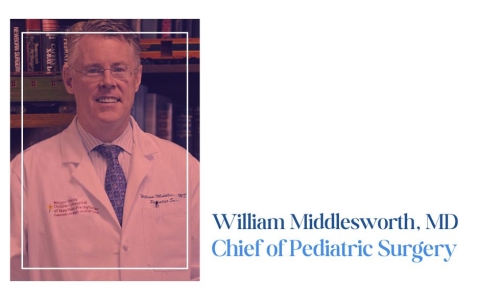
Read our in-depth interview with Dr. Middlesworth about the current and future state of pediatric surgery
Dr. Katherine Fischkoff, Chief of General Surgery:
"We’ve incorporated robotic surgery into all of our surgical care, and the robot is going to continue to transform surgery going forward. Even the robot we have now will evolve over time and make surgery safer, faster, better.
We’re running clinical trials that challenge the standard way we’ve always done things. For example, we’ve been managing lipomas the same way forever, by surgically removing them. But because it’s typically done for cosmetic reasons, it involves all the overhead of coming to the OR, not eating or drinking the night before, and it leaves a scar.
Radiofrequency ablation technology has been used extensively for other tumors, malignant ones like thyroid and liver. We thought we could apply that to lipomas. It’s a perfect way to deal with the cosmetic aspect of a lipoma, without surgery and without leaving a scar.
General surgery is the most basic kind of surgery that gets done in the hospital, but even within that, there are so many ways to innovate and improve patient care. I’d say that’s the most futuristic thing we’re doing: continuing to move forward.
Another piece of this, though maybe not exactly “futuristic,” is that so many of us are trained in critical care, which means we can offer surgery safely to people who wouldn’t otherwise be candidates.
I just saw a woman with a very complicated hernia. She’s had three heart operations, she has lung disease, and all kinds of other medical problems. No one at any other institution would touch her. But because we’re so experienced in critical care, and because of our deep relationships with cardiologists, pulmonologists, and anesthesiologists, we’re able to offer surgery safely, even in complex acute care cases, when others might not. It’s about approaching each patient’s individual needs in the safest ways possible, whether through surgery or not."
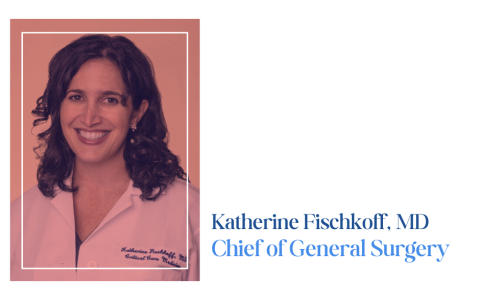
Read more about Dr. Fischkoff and the current and future state of general surgery
Dr. Yuri Novitsky, Chief of Abdominal Wall Surgery:
"Well, certainly robotic technology takes us [to the future]. There are more and more conversations about being able to use machine learning and the utilization of AI in preoperative planning to predict the best procedure or best approaches based on some preoperative imaging. And maybe some robotic technology will allow it to do more consistent suturing, intraoperative measurements of certain things. The technology needs to improve, but to be able to have some AI input into procedure selection is on the horizon.
They're able to collect a lot of information about hand movements every time we do these procedures; information about how we move, how we accomplish steps, efficiency, and whether and how our hands move. They have millions of users, and with all these procedures, they're feeding all that information. Where it’s going to take us, we don't know, but it's certainly exciting to think that we're going to be able to choose the procedures better and provide better care based on 10,000 previous similar operations. Maybe it's a pipe dream, maybe it's reality, but I think certainly that’s the futuristic part of what we do."
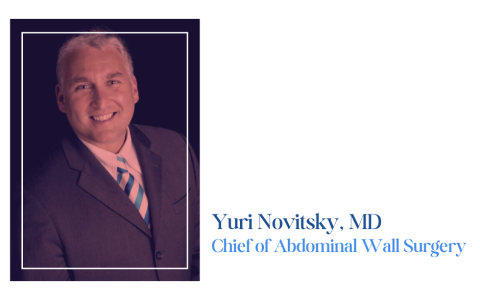
Read more about Dr. Novitsky and the current and future state of abdominal wall surgery
Dr. Tomoaki Kato, Chief of Transplant Surgery:
"One of the biggest things that happened in the past two years is this new technology called normothermic machine perfusion (NMP). It’s a machine that allows us to perfuse the liver with warm, oxygenated blood outside of the body, so the liver actually starts to function while outside the body. The liver produces bile and also processes lactic acid, which means we can tell if it’s going to work or not. So instead of the traditional model—putting the organ on ice and then transplanting it, which always causes some damage—this technology helps avoid injury to the liver. The liver is kind of rehabilitated.
This also helps us with donation after cardiac death (DCD) organs. Traditionally, these organs had quality issues, but with the machine, they’re now much more widely used. That means we’ve increased the organ pool available for transplant. This technology also changes the logistics of surgery; now we can do more transplants in the daytime, which reduces surgeon burnout and improves patient outcomes.
We’re already doing this at Columbia, but the cost is still extremely high because the companies spent a lot of money to develop it in clinical trials, and now they’re charging a lot. Insurance coverage is still hit-and-miss, so sometimes the hospital absorbs the cost. But in the bigger picture, using this technology can reduce the waiting time for patients and ultimately save money by preventing complications that come from waiting too long.
I think this is going to expand beyond the liver to other organs—heart, kidney, etc.—and eventually, it will transform transplant surgery. That’s probably the most futuristic thing happening right now."
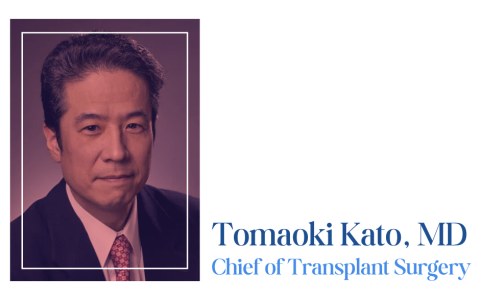
Read more about Dr. Kato and the current and future state of abdominal organ transplant.
Dr. Christine Rohde, Chief of Plastic Surgery:
"I think it's more about where we're going than what we're doing right now. For plastic surgery, tissue engineering has been on the horizon for a while, and it's where we're headed. In plastic surgery, we're often working with soft tissues and reconstructing parts of the body, so the potential of tissue engineering is huge. The idea is to create tissue using a patient's own cells that we can then use for reconstruction. In that sense, it’s very futuristic. It reminds me of an old sci-fi movie where you basically step into a shell and a robot rebuilds your body parts. Those are the kinds of things we’re thinking about in plastic surgery for the future. We’re making baby steps, of course. And AI plays a role in that, too, because it can help us predict the final appearance we’d want for the reconstruction."

Read more about Dr. Rohde and the current and future state of plastic surgery.
Related:
- An Interview with Dr. Craig Smith, Heart Surgeon, Chair of Surgery, and Author of Nobility in Small Things
- Dr AI: Can ChatGPT Step Up To the Medical Challenge?
- State of the Union: Heart Care Today
- Overcoming Hernia after C-Section and Regaining Life as a New Mom

